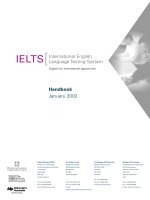English grammar refresher course
Bạn đang xem bản rút gọn của tài liệu. Xem và tải ngay bản đầy đủ của tài liệu tại đây (155.73 KB, 17 trang )
Basics of English
Objective:
•
To learn how to use grammar properly (4)
•
To learn how to read and write the correct spelling of words (4)
•
To learn how to listen and understand carefully (4)
Examples of irregular verbs
Nouns
A noun is a word that names a person,
place or thing.
Examples:
Person-friend
Place-home
Thing-desk
Uses of nouns
As Direct object: follows the verb and
completes its meaning (who or what)
Ex: Shelly’s family bought a new car
As Indirect object: comes between the
verb and the direct object (to whom or
for whom)
Ex: She gave Tina a big hug.
Proper and Common Nouns
Proper nouns name specific people,
places or things.
Ex: Cebu, Vietnam, Beyonce
Common nouns name nonspecific
people, places or things.
Ex: city, country, singer
Abstract and Concrete Nouns
Concrete Nouns: can be touched or
seen
Ex: house, puppy, chair
Abstract Nouns an idea, thought or a
feeling that cannot be touched.
Ex: love, happiness, fear
VERBS
A verb tells what something does or that
something exists
Examples:
•
Tim has shared his apples with us.
•
Those apples were delicious.
•
I hope Tim is bringing more apples
tomorrow.
•
Tim picked the apples himself.
VERB
A verb is the action word in a sentence.
It tells what the subject does (build,
laugh, express, fasten) or that it exists
(is, are, was, were).
Examples:
•
Randy raked the leaves into a pile.
•
I was late to school today.
Verb
Sometimes a verb can be two or more
words. Verbs used to “support” other
verbs are called helping verbs.
Examples:
•
We were listening to music in my room.
•
Chris has been studying for over 2
hours.
Verb Tenses
Present Tense: I walk
Past Tense: I walked
Future Tense: I will walk
Writing: Verb Forms
Present tense verbs
- tell what is
happening right
now. To form
present-tense verbs,
use the “plain” verbs
or use is or are
before the verb and
add ing to the verb
Future tense verbs
- tell about things that
will happen in the
future. To form
future-tense verbs,
use will before the
verb.
Regular and Irregular Verbs
Regular verbs – usually ends in –ed
Irregular verbs- changes completely in
the past tense.
IRREGULAR VERBS
PRESENT
Begi n
Speak
Drink
Know
Eat
wear
PAST PARTICIPLE
Has/have/had begun
Has/have/had spoken
Has/have/had drunk
Has/have/had known
Has/have/had eaten
Has/have/had worn
PAST
Began
Spoke
Drank
Knew
Ate
wore
“BE” as a Helping Verb
A helping verb tells when the action of a
sentence takes place. The helping verbs be
has several forms: am, is, are, was, were and
will. These helping verbs can be used in all
three tenses.
Examples:
Past: Ken was talking. We were listening
Present: I am coming. Simon is walking. They
are singing.
Future: I will work. The puppies will eat.
In the present and past tense, many verbs can be written with or without
the helping verb be. When the verb is written with a form of be, add ing.
Was and is are used with singular subjects. Were and are are used with
plural subjects.
Examples:
Present tense: Angela sings. Angela is singing.
The children sing. They are singing.
Past tense: I studies. I was studying. They
studied. They were studying.
The helping verb “will” is always needed for the future
tense, but the “ing” ending is not used with “will”.
“Will” is both sigular and plural.
“be” as a linking verb
A linking verb links a noun or adjective in the
predicate to the subject. Forms of the verb be
are the most common linking verbs. Linking
verbs can be used in all three tenses.
Examples:
Present: My father is a salesman.
Past: The store was very busy last night.
Future: Tomorrow will be my birthday.
In the first sentence, “is” links the subject
(father) with a noun (salesman). In the
second sentence, ‘was’ links the subject
(store) with an adjective (busy). In the
third sentence, ‘will be’ links the subject
(tomorrow) with a noun (birthday).









